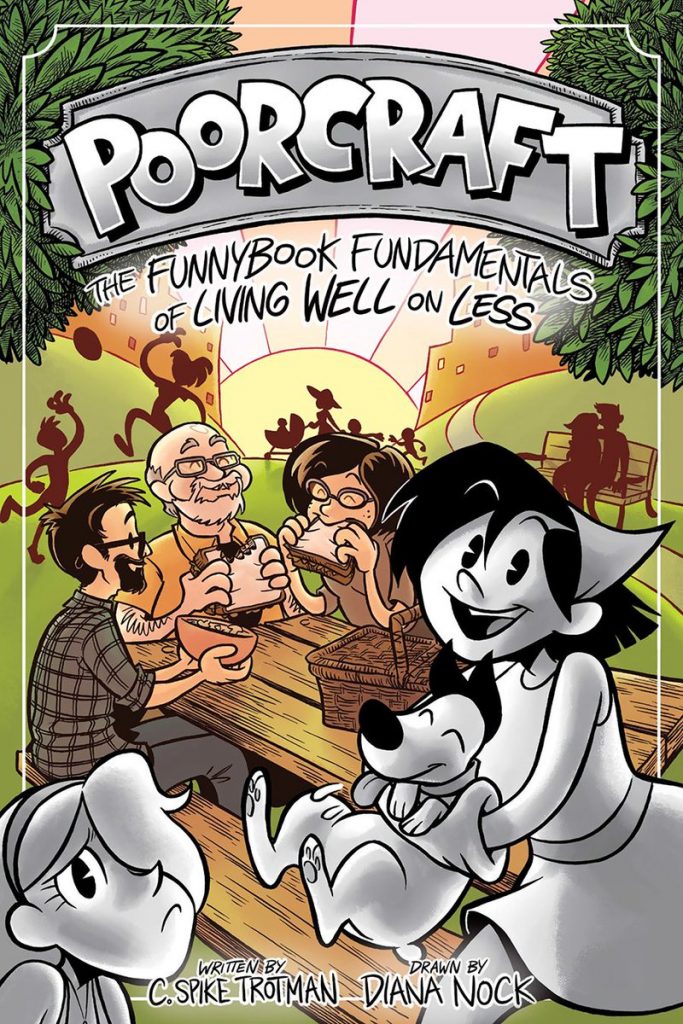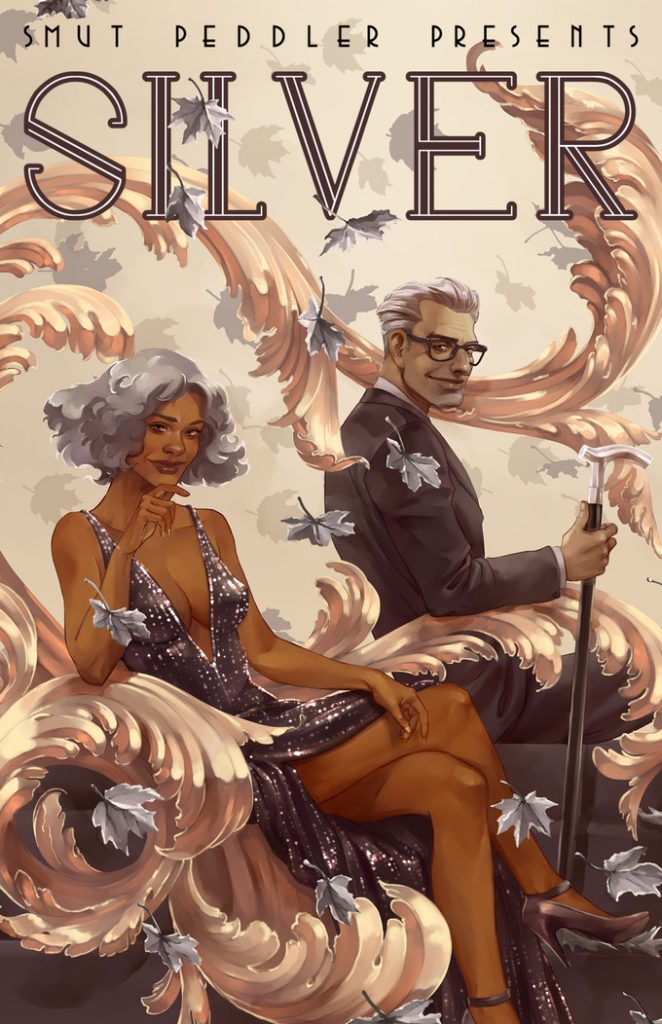“Literally Life-Changing”: Iron Circus Comics’ C. Spike Trotman on Kickstarter’s Impact
To close the loop on this week’s monster feature on crowdfunding, I wanted to share one more interview in full because it’s with the creator who is arguably most synonymous with comics on Kickstarter: C. Spike Trotman. The founder and owner of Iron Circus Comics was one of the most essential people I spoke to for this piece, and we discussed her history with the platform, its transformative nature, why it’s important, downsides related to it, the future of comics on Kickstarter, and more. As per usual, Trotman offers great insight on the subject, and even better, this piece is open to non-subscribers.
However, if you enjoy this chat or enjoyed the feature this week, consider subscribing to SKTCHD for more content like that. Your support funds my work, and is also greatly appreciated.
At this point, you’re probably the most successful and most experienced person in comics when it comes to Kickstarter. But looking back on it, why did you decide to go the Kickstarter route when you first were looking to make some comics projects happen?
C. Spike Trotman: Ha ha, awww, thanks! I dunno, am I really? Maybe in the publisher sphere.
And honestly, I chose Kickstarter because it was the only option! I started launching projects on the platform in 2009 because it was just an evolution of what a lot of webcomic people were doing already; self-funding projects from fanbase donations and pre-orders. Kickstarter was better than our Paypal tip jars because it was transparent and automated; it meant less work for us and more visibility for our work. There was also an element of discoverability that just running projects from our own sites didn’t necessarily have. On Kickstarter, potential backers can browse categories that appeal to them, and find something they may have never even seen before. That’s always a plus.

Did you consider other crowdfunding platforms initially, or was it always Kickstarter from the jump?
Trotman: Oh, there were NO OTHER crowdfunding platforms when I started using Kickstarter. It launched in 2009, and that’s when I ran my first project! “Crowdfunding” wasn’t even a word, back then. Hell, when I first used Kickstarter, it seemed like some people couldn’t say enough about how unprofessional it was, how it was essentially begging, how using Kickstarter sealed my fate because now NO ONE would take me seriously, how I was “a hobo with my hat out,” all kinds of stuff. My personal favorite criticism? That I shouldn’t use Kickstarter; that if I wanted $10,000 to print a comic, I should “put on a suit, go down to the bank, and get a loan like an adult.”
Can’t think of a single Never-Kickstarter type who hasn’t launched a project by now, by the way. Funny how that works.
After so many successful projects, what keeps you going back to Kickstarter?
Trotman: Two things: Going to print in the black and testing out new projects.
Kickstarter is the primary reason Iron Circus has been able to grow at the speed it has. Not having to wait on the new book to earn back before I could invest in printing more titles has been an amazing boon. And it’s a fantastic testbed for untested concepts, like an art book or a short animation. a successful Kickstarter lets me know there’s demand. For the foreseeable future, I don’t see any reason to NOT use Kickstarter, when the situation merits it; I’ve built a strong audience that likes what I put out. Every time I launch a new project, 25,000 previous backers get an email about it. That’s a phenomenal advantage!
This is obviously a much broader question beyond what you do, but what do you think makes crowdfunding in general such an attractive option for both fans and creators?
Trotman: Well, like I previously mentioned, there’s the advantage of potentially going to print in the black. And there’s the satisfaction a fan can get, knowing they’re directly supporting a creator, without a middleman. A lot of creative industries put a lot of space between the creator and fan, and take a majority cut while doing it; Kickstarter has the potential to make a model like that obsolete. Don’t get me wrong, a competent publisher can really take a creator places they can’t get on their own! But I strongly feel going with a third-party publisher should be voluntary, not mandatory. It should be a choice a creator makes because it’s what they want. if they DON’T want that, Kickstarter is there for them.
Do you feel as if there’s any downside to the reduced distance between creators and fans through those platforms? Or is it all good?
Trotman: Ha, unfortunately yes. There’s a term that’s been useful to me, “parasocial relationship?” It’s when someone invests a lot of time and emotional energy into a relationship with someone who is either dimly aware of them, or not aware of them at all. And while you don’t have to be famous (or e-famous) to be in a relationship like that, if you’re a public figure, the possibility of a relationship like that manifesting goes up exponentially. And unfortunately, I’ve had issues with that. people who genuinely think I’m their friend, because I fave their replies to me on Twitter or something. It can get pretty uncomfortable.

You obviously are a crowdfunding ace, but I was curious if you think there are potential disadvantages to crowdfunding, or to remix that a little bit, bad fits for crowdfunding, either creative or creator wise?
Trotman: Oh, there are projects I’d NEVER try to crowdfund, even though I love the book and think it’ll do well in distro! But good ideas fail on Kickstarter all the time, we don’t live in a meritocracy. A good Kickstarter prospect features a creator with a pre-existing online audience; one with a mailing list, who’s active on social media, who posts work frequently and talks to fans. Someone who’ll participate in any promo we line up, like interviews or podcast appearances. It helps a lot if they have natural charisma, too, which is unfair to the wallflowers of the world, but nevertheless true. A lot of Kickstarter support is about supporting the individual, so frankly, the more people out there that know you, like you, and want to see you succeed, the better your chances. You could be the author of a masterpiece, A world-rocking book that will change the course of publishing, but if you won’t promo your campaign, that won’t mean much to the bottom line.
Do you think going crowdfunding only would be plausible for comics on a broader scale? Or is it purely dependent on who is doing it?
Trotman: I think it already is! Kickstarter is practically an expected milestone in the careers of modern comic creators, now. You don’t have to look very hard to find articles that talk about how, if Kickstarter were classed as a publisher, it would be anywhere from the fourth to the second-largest dedicated comics publisher in the industry, with more comics revenue than Dark Horse! I can’t imagine a much broader scale than the one it already enjoys among cartoonists.
Do you see crowdfunding as something that could keep growing for comics? Or do you think there’s a real divide between those who might back projects + those who might try and deliver on these platforms and everyone else?
Trotman: I think we’re far from the ceiling on what Kickstarter can do for cartoonist/comic creators, because supporting a cartoonist on Kickstarter is about being a fan more than anything else. There’s not some big pool of money we all draw from, and then when it’s empty, we hit a wall and there’s no more room for anyone new. Each creator/project creator brings their own personal fanbase to the site. Sometimes there’s crossover between projects, sometimes not. But the main point is, the only limit on what KS can do for creators, in my opinion? The kind of creators who use it, and what they use it for. It’s a fantastic platform, literally life-changing.
